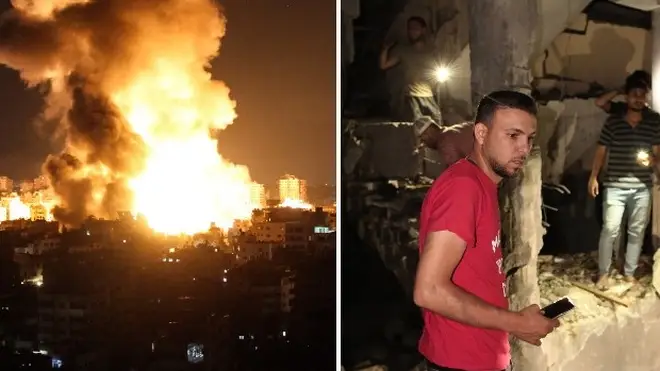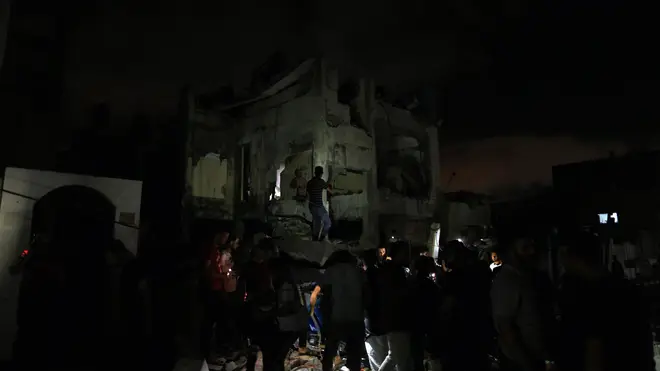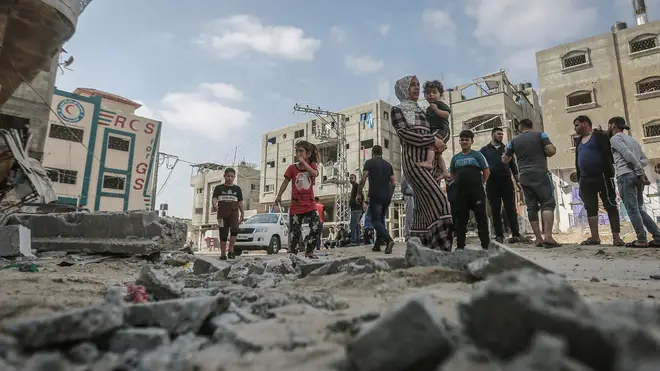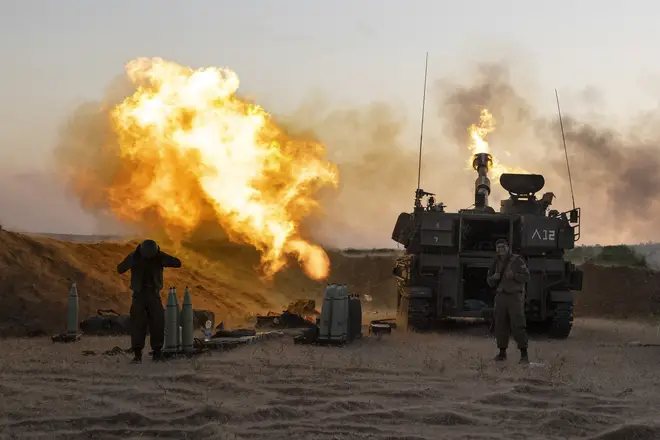
Iain Dale 10am - 1pm
20 May 2021, 11:50

Israel has unleashed another wave of airstrikes across the Gaza Strip as nations including the US and Egypt attempt to broker a ceasefire agreement.
The latest bombardment came after Prime Minister Benjamin Netanyahu rejected pleas from the US to wind down the offensive against Gaza's militant Hamas rulers, who have fired thousands of rockets at Israel in the past week.
The Israeli PM vowed to continue the offensive, with a barrage of missiles hitting Gaza City overnight and airstrikes also reported in the towns of Deir al-Balah and Khan Younis.
READ MORE: Israel 'determined to continue' strikes against Gaza despite Biden's plea for peace
On Thursday morning, Palestinians surveyed the rubble from at least five family homes destroyed in Khan Younis.
The Israeli military said it struck at least four homes of Hamas commanders, targeting "military infrastructure", as well as a weapons storage unit at the home of a Hamas fighter in Gaza City.

An Israeli airstrike smashed into the Khawaldi family's two-storey house in Khan Younis, destroying it. The 11 residents, who were sleeping in a separate area out of fear, were all wounded and taken to hospital, according to neighbour Shaker al-Khozondar.
Shrapnel from the explosion hit his family home next door, killing his aunt and wounding her daughter and two cousins, he said.
Weam Fares, a spokesman for a nearby hospital, confirmed her death and said at least 10 people were wounded in strikes overnight.
READ MORE: Israeli airstrike destroys Gaza tower block HQ of international media outlets

Israeli air strike on Gaza City kills 10 as unrest spreads to West Bank
At least 227 Palestinians have been killed so far in the latest conflict, including 64 children and 38 women, with 1,620 people wounded, according to the Gaza Health Ministry.
Twelve people in Israel, including a five-year-old boy, a 16-year-old girl and a soldier, have also been killed.
On Tuesday, Mr Netanyahu pushed back against calls from the Biden administration to wrap up the operation that has left hundreds dead.
It marks the first public rift between the two close allies since the fighting began last week and could complicate international efforts to reach a ceasefire. His pushback also poses a difficult early test of the US-Israel relationship.


After visiting military headquarters, the Israeli PM said on Wednesday he appreciated "the support of the American president" but that Israel would push ahead to return "calm and security" to its citizens.
He said he was "determined to continue this operation until its aim is met".
Mr Biden had previously avoided pressing Israel more directly and publicly for a ceasefire but pressure has been building inside his own party to intervene more forcefully.
Egyptian negotiators have also been working to halt the fighting, and an Egyptian diplomat said top officials were waiting for Israel's response to a ceasefire offer.
WATCH: Bombs fall on Gaza during Matt Frei's interview with resident

'Innocent children are dying, what is Israel doing to de-escalate?'
Moussa Abu Marzouk, a top Hamas official, told the Lebanese Mayadeen TV that he expected a ceasefire in a day or two.
The current round of fighting between Israel and Hamas began on 10 May, when the militant group fired long-range rockets towards Jerusalem after days of clashes between Palestinian protesters and Israeli police at the Al-Aqsa Mosque compound, a flashpoint site sacred to Jews and Muslims.
Heavy-handed police tactics at the compound and the threatened eviction of dozens of Palestinian families by Jewish settlers had inflamed tensions.
Since then, Israel has launched hundreds of airstrikes that it says have targeted Hamas' infrastructure, including a vast tunnel network it refers to as the "Metro".
Hamas and other militant groups embedded in residential areas have fired more than 4,000 rockets at Israeli cities, with hundreds falling short and most of the rest intercepted or landing in open areas.